June 19, 2025 | 14:28 GMT +7
June 19, 2025 | 14:28 GMT +7
Hotline: 0913.378.918
June 19, 2025 | 14:28 GMT +7
Hotline: 0913.378.918
The 6th National Startup Festival for Students 2024, recently held at Can Tho University, attracted many projects and ideas from the student block. Among them are projects that apply new technologies, such as IoT, Big Data, or AI technology. In particular, there are projects that have initially been successfully implemented and transitioned to a profitable stage with impressive growth in revenue and profit indicators.
At the festival, the small space displaying the startup idea of the "EcoTraceTech – System for measuring CO2 and CH4 emissions from rice plants" project team has become the focus of attention from many experts and specialized agencies.
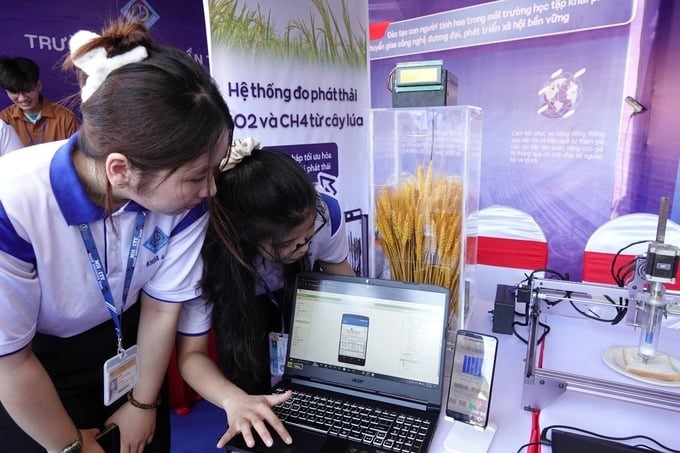
Project "EcoTraceTech – System for measuring CO2 and CH4 emissions from rice plants" of a group of Can Tho University students. Photo: Kim Anh.
This is a startup idea created by a group of three young people in course 48 of Can Tho University, namely Le Lu Huyen Tran and Mai Nhat Minh, majoring in software engineering, and Le Nguyen Anh Thu, majoring in banking and finance, along with two other students, Thach Duc Trong and Nguyen Dang Tien Bao, who are majoring in control engineering and automation.
Le Lu Huyen Tran, project team leader, said that this startup idea was formed through a speech by Prime Minister Pham Minh Chinh at the 26th Conference of the Parties (COP26) of the UN Framework Convention on Climate Change. In particular, the leader of the Vietnamese Government emphasized the direction towards Net Zero by 2050.
In Vietnam, the Mekong Delta is an area with outstanding advantages in agriculture, but it also produces a large amount of emissions, especially from rice plants. Meanwhile, changing farming practices among farmers still faces many difficulties.
The idea was formed, combining with the knowledge accumulated during the study process, so the young people began to plan research and come up with solutions to build a model of gas emission measuring equipment through applying IoT software technology.
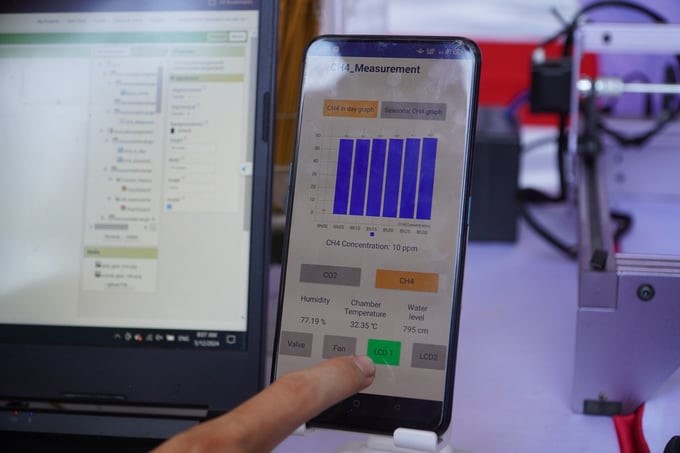
The system is designed quite simply, making it easy for farmers to use on mobile phones. Photo: Kim Anh.
The project team spent 6 months researching and collecting data from the handbook for measuring greenhouse gas emissions in rice cultivation of the Institute for Agricultural Environment (Ministry of Agriculture and Rural Development); the research on CH4 and N20 gas emissions from crop cultivation in the Red River Delta by the Institute of Hydrometeorology and Climate Change (Ministry of Natural Resources and Environment); and documents from other experts.
By the end of 2023, a test model called "EcoTraceTech – System for measuring CO2 and CH4 emissions from rice plants" was born. Up to now, the project is in the phase of testing measurement, comparing data from the system and data from manual measurement to provide formulas and results for calculating emissions in the most accurate and effective way.
"The project team realizes that currently, in Vietnam in general and the Mekong Delta in particular, gas emission measurement is mainly done manually. Samples are taken from the field and then sent to the laboratory for measurement using a gas chromatograph analyzer. This method takes a lot of effort and is inconvenient for farmers. Therefore, the team came up with a solution to combine sensors from the IoT device and measure directly in the field, then send measured data to mobile phones," Le Lu Huyen Tran shared about the team's startup idea.
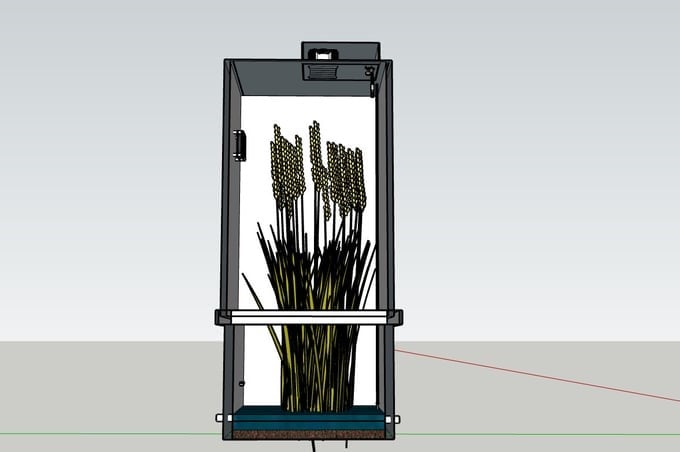
Overall simulation diagram for the design of the system for measuring CO2 and CH4 emissions from rice plants. Photo: Kim Anh.
After this measurement system model is completed, the project team will conduct field experiments and continue to adjust the data accordingly. In addition, the project also calculates external factors affecting rice plants, such as temperature, humidity, water level, etc., that affect gas emissions.
EcoTraceTech – System for measuring CO2 and CH4 emissions from rice plants is currently one of the startup ideas representing Can Tho University to participate in the Startup Ideas 2024 arena (UNIIC IDEATHON 2024) at Palawan State University (Philippines).
UNIIC IDEATHON 2024 is organized by the University Incubator Consortium (UNIIC) to provide a platform for early-stage startup projects to present ideas. At the same time, it gives investors the opportunity to explore new business projects. UNIIC IDEATHON 2024 is an opportunity to help projects expand their networks, facilitate connections with partners and investors, and find additional resources for their ideas.
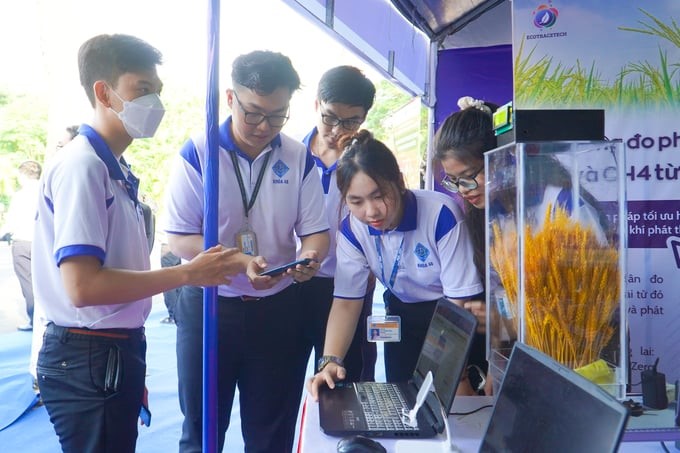
UNIIC IDEATHON 2024 is a playground to exchange and share experiences of startup models among students of 12 schools in UNIIC. Photo: Kim Anh.
The competition is deployed in five areas, including smart cities, climate change, health care, smart agriculture, and innovation in food technology. Project teams participating in the competition will propose potential solutions to address challenges in the above-mentioned areas.
The project "EcoTraceTech – System for measuring CO2 and CH4 emissions from rice plants" was implemented with the wish to use direct measuring devices to give quick and highly accurate results. Thereby proposing eco-friendly farming methods and sustainable farming practices.
The unique feature of this system is real-time data collection and the application of IoT technology in measuring and calculating emissions. Particularly, the system is designed to ensure simplicity, making it easy for farmers to access data remotely.
According to calculations by the project's invention team, it is expected that when the hardware is completed, the machine will be sold directly to farmers, environmental agencies, and distributors at basic and mid-range levels, ensuring to maximize the value that people receive.
In planning the project development strategy in the coming time, Le Lu Huyen Tran said that in the first year, the project team will focus on building the brand and attracting customers. The next 2–3 years will focus on increasing sales, adjusting pricing strategies, and expanding service offerings. From the 4th–5th years, when profits are achieved, the project team will expand the scale of operations and seek partnerships to expand the market.
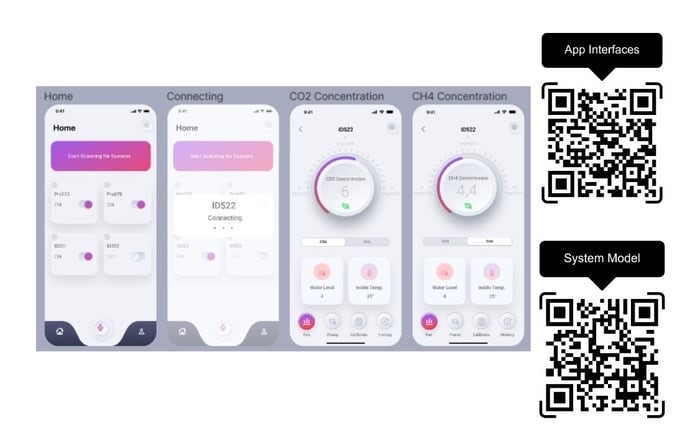
The control interface for the system for measuring CO2 and CH4 emissions from rice plants is integrated into a mobile phone. Photo: Kim Anh.
Currently on the market, businesses specializing in IoT devices are popular, especially units providing CH4 and CO2 gas measuring equipment similar to the model the project team is developing. This is a challenge. that young people have seen. Therefore, when determined to develop the EcoTraceTech Project, the team focused on building a user platform with a friendly interface design that farmers can easily use and monitor on mobile phones.
The new point about the EcoTraceTech Project’s strategy is that young people have known how to build communities through educational workshops, building success stories of farmers, and integrating activities on climate change and environmental protection at research institutes to better approach farmers.
In particular, to maintain a competitive advantage for their product, young people will continuously improve, train, support, build strategic partnerships, and expand the market. Those are long-term strategies in the development plan of the project "EcoTraceTech – System for measuring CO2 and CH4 emissions from rice plants."
Translated by Thu Huyen
![Turning wind and rain into action: [9] Digitizing hydrometeorological data in response to climate change](https://t.ex-cdn.com/nongnghiepmoitruong.vn/608w/files/news/2025/06/17/z6704423696987_15fd32ffc26d590d204d520c9dac6786-nongnghiep-165943.jpg)
(VAN) Farmers have begun accessing hydrometeorological applications to adjust their cropping schedules, aiming to ensure productivity and adapt to climate change.
![Turning wind and rain into action: [8] Real-time salinity detection and early warning technology](https://t.ex-cdn.com/nongnghiepmoitruong.vn/608w/files/news/2025/06/17/z6704423696987_15fd32ffc26d590d204d520c9dac6786-nongnghiep-151127.jpg)
(VAN) Thanks to the integration of modern hydrological-hydraulic models, remote sensing technologies, and artificial intelligence, the accuracy of hydrological forecasting has significantly improved.
![Turning wind and rain into action: [7] Early disaster warnings help marine farmers minimize losses](https://t.ex-cdn.com/nongnghiepmoitruong.vn/608w/files/news/2025/06/17/z6704423696987_15fd32ffc26d590d204d520c9dac6786-nongnghiep-142942.jpg)
(VAN) In recent years, thanks to early disaster warnings and forecasting, marine farmers in Khanh Hoa province have been able to reduce risks and losses, thereby improving production efficiency.
![Turning wind and rain into action: [6] ‘Four on-the-spot’ disaster management software](https://t.ex-cdn.com/nongnghiepmoitruong.vn/608w/files/news/2025/06/17/e5a48259d6a262fc3bb3-nongnghiep-183800.jpg)
(VAN) By simply activating the scenario on the disaster management software, the relevant authorities immediately know how many households need to be evacuated, where to evacuate them to, and by what means of transportation…
![Turning wind and rain into action: [5] Hue applies modern technology in disaster forecasting](https://t.ex-cdn.com/nongnghiepmoitruong.vn/608w/files/news/2025/06/17/z6704423696987_15fd32ffc26d590d204d520c9dac6786-nongnghiep-093938.jpg)
(VAN) In Hue city, modern technology has recently been applied in meteorological and hydrological forecasting and warning, helping to reduce the damage caused by natural disasters.

(VAN) A cutting-edge farming technique being implemented on an experimental ranch in Arizona's Sonoran Desert has already saved a billion gallons of water over five years, according to Civil Eats.

(VAN) Poultry and pig production and the environment can be boosted through enhanced water technology, according to new research.